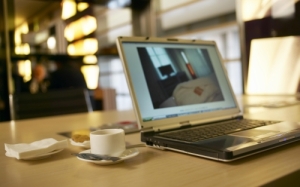The Clarion Hotel in Portland cut its chlorine use by 87 percent.
 The phosphates reduce the chlorine’s effectiveness. Adding a food grade enzyme to the water reduces the phosphate level and allows chlorine to do its work. Not only is less chlorine needed, but it also lasts longer, Cooke said.
The phosphates reduce the chlorine’s effectiveness. Adding a food grade enzyme to the water reduces the phosphate level and allows chlorine to do its work. Not only is less chlorine needed, but it also lasts longer, Cooke said.
The pool was part of a test project with the state of Maine Department of Environmental Protection to help reduce use of the chemical, which has been linked to skin and eye irritations, lung damage and asthma. The project also saved some money.
“It is very easy,” said Peter Cooke, DEP pollution prevention program manager. The agency funded the project with a $30,000 federal grant. Overchlorination is common at public swimming pools because of the high levels of phosphates, Cooke said. Phosphates occur naturally in some water but are commonly added by water treatment plants to prevent corrosion in municipal water pipes.
The phosphates reduce the chlorine’s effectiveness. Adding a food grade enzyme to the water reduces the phosphate level and allows chlorine to do its work. Not only is less chlorine needed, but it also lasts longer, Cooke said.
Don Hopkins, operations manager for the Olympia Companies, property management company of the Clarion Hotel, said regular swimmers at the pool immediately noticed a difference.
“They said it smelled better and the water felt softer on the skin, ” Hopkins said.
He said workers at the hotel also noticed the difference. Hopkins said adding the enzyme to the 30,000-gallon pool saved $200 a month in chlorine costs, compared to the $130 monthly cost of the enzyme. The company is now looking to reduce chlorine at pools at some of its other hotel properties, he said.
For more:Â http://www.onlinesentinel.com/news/using-enzyme-reduces-need-for-pool-chlorine_2010-12-21.html#











